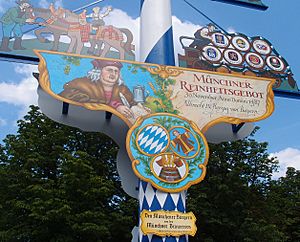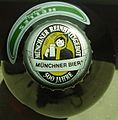Reinheitsgebot facts for kids

The Reinheitsgebot is a famous German rule about how beer should be made. It's all about keeping beer pure! This rule began in 1516 in a German city called Ingolstadt, which is in Bavaria.
Contents
What the Rule Said
The Reinheitsgebot was very clear about what could be used to make beer.
Allowed Ingredients
The original rule said that beer could only be made with three simple things:
Beer Price Rules
The Reinheitsgebot also set a price for beer. This was important for taxes. The price was usually 1 or 2 Pfennigs for a Maß (a large mug of beer).
Different Names, Same Rule
Sometimes you might hear people talk about the Bavarian Reinheitsgebot or the German Reinheitsgebot. They are all talking about the same important rule. Other parts of Germany had similar rules too.
How the Rule Changed
The Reinheitsgebot is not a German law anymore. A new rule called the Provisional German Beer Law took its place. This new law allows some things that the old Reinheitsgebot did not. For example, it allows wheat malt and cane sugar. However, it does not allow unmalted barley.
The Role of Yeast
When the Reinheitsgebot started, people didn't know about yeast. Yeast helps beer ferment, which means it turns sugar into alcohol. It wasn't until the 1800s that Louis Pasteur discovered how yeast worked during fermentation. Before that, brewers (people who make beer) would just reuse some of the leftover stuff from an old batch of beer to start a new one.
Why Hops Were Used
Hops were added to beer to help keep it fresh for longer. This is called preservation. In the Middle Ages, some brewers used other things, like certain mushrooms, to preserve beer. The Reinheitsgebot made sure that only hops were used for this purpose. Other plants, like stinging nettles, were sometimes used before hops became common. Interestingly, stinging nettles are in the same plant family as hops!
Breaking the Rule
If a brewer didn't follow the Reinheitsgebot, there was a punishment. The beer barrels would be taken away by the state and destroyed. The brewer would not get any money for the lost beer.
Reinheitsgebot Today
Even now, many brewers are proud of the Reinheitsgebot. Most German breweries say they still follow it. For some, it's a way to show off their beer's quality. However, the original rule only allowed barley. This means that all wheat beers, which are very popular today, were not allowed by the first Reinheitsgebot.
Belgian Beers
Belgian beers are made differently from German ones. Belgian brewers often add sugar to help the fermentation process. Belgian beers have a very long history, just like German beers, but they taste quite different.
Images for kids
See also
 In Spanish: Ley de pureza de 1516 para niños
In Spanish: Ley de pureza de 1516 para niños
 | Laphonza Butler |
 | Daisy Bates |
 | Elizabeth Piper Ensley |





